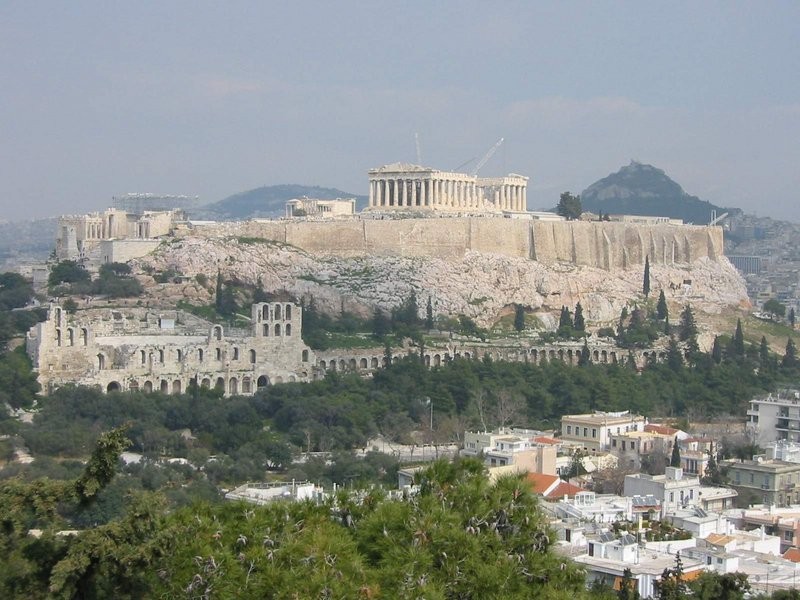Cities have always been about bringing people together and creating new ideas
Editor’s Note: City Observatory Director Joe Cortright will be giving the Harold Vatter Memorial Lecture in Economics at Portland State University on Thursday, May 2. His theme will be “Cities in the Knowledge Economy.” As a prelude to that lecture, we’re offering this 2015 commentary based on a visit to Athens.
Though the local economy is still in turmoil, Athens is still awash in the steady tramping of tourists. Compared to your correspondent’s last visit to this city three decades ago, the distinguishing mark of tourism is no longer the long lines of foreigners looking to exchange deutsche marks, yen, pounds and travelers checks for drachmas, but rather the parade of latter day Narcissus, with smart phones appended from selfie-sticks dutifully capturing the ancient sights as backdrops of a digitized odyssey.
Credit: Galería de Faustino, Flickr
As ever, the Parthenon looms over the city, a visible reminder of the sublime accomplishments of the Ancient Greeks. The building is a ravaged remnant of its former self, but is nonetheless majestic, and its image, like so much of what the Greeks created is still deeply imprinted on our collective conscious—which is probably why the city remains such a compelling destination.
The Greek original seems so familiar because it has been so widely copied. In my own American hometown, as in countless others, the headquarters of the local bank copies in proportions, details and material the design of the Parthenon—it is the temple of money.
But the imprint of Greek culture on current life, of course, runs much deeper than architecture. So many of the concepts that guide or define modern life were either devised or at least given names here: our notions of democracy, the polity, the agora, as well as enduring contributions to art, science and mathematics. And Greece was fundamentally structured as a series of city-states. The Greek nation was a purely modern invention; Ancient Greece was always a constantly shifting, often warring set of cities, occasionally–but always temporarily–welded together by invading empires (or the threat of invasion).
As Ed Glaeser says in Triumph of the City, cities are mankind’s greatest creation. And much, though certainly not all, of what we treasure about cities can trace its routes to the city-states of this region, most notably Athens. But there was a flowering of cities in this part of the world two to three millennia ago.
Some of the earliest known human settlements trace their roots to this region, in fact. As Jane Jacobs famously relates in her book The Economy of Cities, the excavation of one particularly ancient settlement Catal Huyuk, in Asia Minor—modern day Turkey—provides a compelling insight into the importance of cities to civilization.
The generally received wisdom about cities is that urbanization and permanent settlements were the accidental, or perhaps incidental by-product of improvements in agriculture: that our hunter-gatherer ancestors stumbled upon or made some advances in crop raising that led them to settle permanently in some locations, and that as agricultural productivity improved, people had more time for alternate pursuits and managed to develop other skills. Jacobs turns this agriculture-led creation myth on its head.
In her imaginative tale of how things could have happened, Jacobs describes the development of a settlement she calls New Obsidian, which begins as a place of assembly for nomadic groups where bartering of diverse commodities and crafts, leads to the establishment of a permanent settlement. The settlement then becomes a place, not just for trade, but also for animal husbandry, inadvertent cross-pollination of grains, the refinement of crafts and tool making, and ultimately increasingly sophisticated production. In Jacobs’ story, the creation of “new work” in cities leads to higher productivity in agriculture and stimulates development.
Ultimately, that process of developing more advanced technology, more complex economies, successively larger cities and the institutions needed to organize and govern them led to the city-states whose remnants we see today, in places like Athens. And that process continues apace today. Cities are even today steadily creating the “new work” that propels economic growth and improves our standard of living. There’s little reason to believe this process has reached its culmination.
As Paul Romer provocatively argues, we should be thinking about new cities as a way to tackle the problems of improving the living standards of the billions of people who still lag the most advanced nations. In his proposal for “Charter Cities” Romer argues for innovative institutional arrangements that would allow for experimentation with policies to deal with development, transportation, criminal justice and global warming. Romer comes to cities from an interesting perspective: in the 1980s, he authored two seminal papers on “New Growth Theory” that pointed to our ability to continually create new ideas as the driving force behind long term economic growth. In recent years, he’s turned his attention to cities as the venue for devising new institutions that can easily give rise to and apply new ideas. You can read a recent interview with Romer here.
There’s much glib talk of “Smart Cities” with an excessive focus on how new technologies – from the so-called “Internet of Things” to autonomous vehicles will reshape city life. It is likely that these things will emerge, evolve and be applied in cities. And it will be the cities that bring people together, that promote the free flow of ideas, that exhibit a certain democracy in their affairs, that are likely to be the most successful in realizing these technologies. And while the technologies would amaze the ancient Greeks, the kind of values that such a community would embody would not seem unfamiliar to them.


